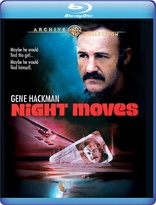Night Moves Blu-ray Movie
HomeNight Moves Blu-ray Movie 
Warner Archive CollectionWarner Bros. | 1975 | 100 min | Rated R | Aug 15, 2017
Movie rating
7.5 | / 10 |
Blu-ray rating
| Users | 4.0 | |
| Reviewer | 4.5 | |
| Overall | 4.0 |
Overview
Night Moves (1975)
Cut-rate private eye Harry Moseby finds himself caught in a labyrinth of mendacity and murder. Hired to locate the runaway daughter of faded Hollywood actress Arlene Iverson, Harry heads to the Florida Keys, where what he considered a run-of-the-mill case turns into something much more. Meanwhile, his marriage is slowly disintegrating.
Starring: Gene Hackman, Jennifer Warren, Edward Binns, Harris Yulin, Kenneth MarsDirector: Arthur Penn
| Film-Noir | Uncertain |
| Crime | Uncertain |
| Mystery | Uncertain |
| Thriller | Uncertain |
Specifications
Video
Video codec: MPEG-4 AVC
Video resolution: 1080p
Aspect ratio: 1.78:1
Original aspect ratio: 1.85:1
Audio
English: DTS-HD Master Audio 2.0 Mono (48kHz, 24-bit)
Subtitles
English SDH
Discs
Blu-ray Disc
Single disc (1 BD)
Playback
Region free
Review
Rating summary
| Movie | 4.5 | |
| Video | 5.0 | |
| Audio | 4.0 | |
| Extras | 1.5 | |
| Overall | 4.5 |
Night Moves Blu-ray Movie Review
Working on Mysteries Without Any Clues
Reviewed by Michael Reuben August 15, 2017The late Arthur Penn will probably always be best remembered as the inventive director of
Bonnie and Clyde, the 1967 succès
de scandale that redefined cinematic violence two years
before Sam Peckinpah unleashed The Wild
Bunch. But Penn was also a gifted theater director, and
deep explorations of character came to him as naturally as calling "Action!" and "Cut!" He
directed the original Broadway production of The Miracle Worker starring Anne Bancroft and
Patty Duke, then helmed the film adaptation that won Oscars for both
actresses. As recently as
2002, at the ripe age of 80, Penn was still directing actors to awards with his Broadway staging of
Fortune's Fool starring Frank Langella and the late Alan Bates, both of whom won Tonies.
Penn's neo-noir Night Moves attracted little attention when it was first released in 1975, but the
director's sure hand is evident throughout this distinctive blend of classic detective tropes with
relentless character study, and the film's reputation has risen steadily in the intervening decades.
The title has consistently ranked at the top of the Warner Archive Collection's list of requested
Blu-rays since WAC ventured into the format five years ago, but it has taken until now for fans'
pleas to be answered. Much of the reason for the delay is the technical demands of the project,
which are discussed below in the Video evaluation. But the wait has been worth it.

My colleague Josh Katz, who writes Blu-ray.com's weekly new-release column, has so effectively captured the essence of Night Moves that I am reproducing his discussion in full, with Josh's approval:
The 1970s represented some kind of renaissance in neo-noir cinema—in one eighteen-month-period, we got both Roman Polanski's Chinatown and Robert Altman's The Long Goodbye—so it's saying something that Night Moves deserves acknowledgment with the very best of them. For the film's first half, we could be watching the great Travis McGee mystery never made. While this isn't a direct adaptation of one of John C. MacDonald's McGee thrillers, Alan Sharp's script has the same kind of lazy charm and casual menace, thanks in large part to Sharp's wonderfully etched noir hero: Harry Moseby (Gene Hackman), a running back-turned-P.I. who's searching for an aging former starlet's promiscuous daughter (Melanie Griffith).
Hackman's presence is the first indicator that Night Moves won't play by traditional noir rules. He is painfully aware that he's an also-ran, that any initial promise he had as a football star is long gone, and he accepts his fate with a ruefulness that masks a deep depression. In one of the film's brilliant little vignettes, he comes face-to-face with his wife's lover (Harris Yulin), and an encounter that we think will turn violent de-escalates once Yulin's character starts sympathetically taking the measure of the beyond-beleaguered Moseby. Hackman was never better than when he was playing insecure men painfully aware of their own inadequacies (even his Unforgiven and Royal Tenenbaums blowhards puff themselves up to distract others from noticing their crippling character flaws), and Moseby ranks as one of his finest performances.
If we just got to watch Hackman amble around the film's Florida Keys locations and half-ass his missing persons case, Night Moves would satisfy (you gotta figure the Coen Brothers are big fans of this one), but Penn and Sharp use the film's lazy early-goings to gut the viewer. The more Moseby dawdles, the more he starts getting drawn into the real danger at the center of his case, and we're reminded of the similar magic Penn employed in his groundbreaking Bonnie and Clyde. That 1967 classic started out as a slapstick-y hayseed comedy before exploding in a rush of still-graphic violence, and Night Moves, too, develops stakes that Harry seems ill-equipped to confront, culminating in an ending that is apocalyptic in its yawning ambiguity. Yet the shift works because Penn is so clear in his objectives. Without making any explicit political claims or stating a party affiliation, Penn has crafted a deeply political film, one that looks at our most trusted institutions and sees only chaos. I'm sure that Penn was commenting on Watergate and Nixon, but Night Moves resonates just as strongly in 2017 as it did in 1975. We're just as trapped as Moseby, and that's just the way Penn would have it. I am at a loss how this one got lost in the sands of time—it's one the defining films of the 1970s.
Night Moves Blu-ray Movie, Video Quality 
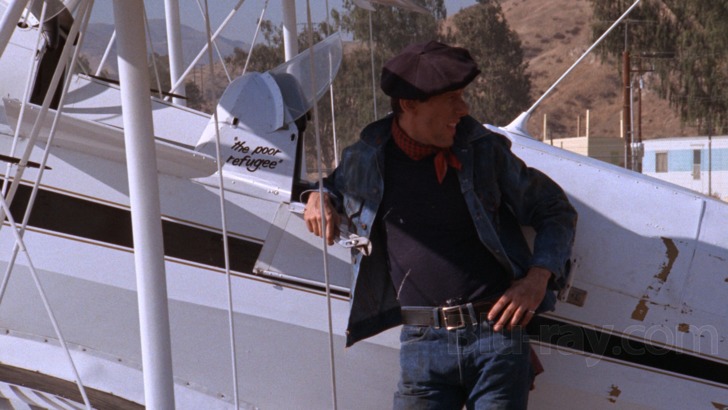
The late Bruce Surtees photographed Night Moves in between his many projects with Clint
Eastwood, which extended from Play Misty for Me
to Pale Rider. Surtees' famous preference for
dim lighting is repeatedly on display here, but much of Night Moves plays out in sunny outdoor
locations and well-illuminated interiors. The bright clarity of these images provides an ironic
counterpart to the many hidden agendas winding through the film. And when the director wanted
darkness, Surtees delivered (for an example, see screenshot 32). The film's palette is realistic to
the point of dullness, which was not only typical of Seventies cinema but, in this case, also suits
both the beaten-down character of Hackman's private detective and the mundane nature of his
small-time practice (at least, until this latest case).
Night Moves traveled a long path to Blu-ray. The Warner Archive Collection began with its
customary approach of commissioning a new 2K scan from an interpositive, which was
performed by Warner's Motion Picture Imaging facility. However, as MPI began its job of color-correcting the results of the scan, unexpected
problems emerged. Although the IP had been
accurately color-timed, it was plagued by issues that could not be fully addressed by digital
adjustment; these included flickering and graininess that was exceptional for an element only one
generation away from the original camera negative. After further evaluation of the IP and
extensive consultation between WAC and MPI, the decision was made to start over by retrieving
the camera negative from the vault—a decision not undertaken lightly, given the care with which
an OCN must be handled. A new scan was performed, and as per standard Warner policy when
dealing with an OCN, this second scan was done at 4K.
Digital color-correction is a far lengthier and more labor-intensive proposition with an OCN than
it is with an interpositive, because the latter already contains numerous adjustments achieved
photochemically. In one of his Se7en commentaries, David
Fincher observed that scanning from
OCN amounts to "starting from scratch", because every shot has to be reevaluated and adjusted
for densities, shadow, color values, etc. This is why 4K scans from negative still remain the
exception, especially for catalog titles that are unlikely to sell in large numbers. A 4K scan costs
more than a 2K, and the expense of the many additional hours of colorist's labor mounts up quickly.
The raw 4K scan of Night Moves has been meticulously color-corrected by one of MPI's premier
colorists, followed by WAC's customary cleanup to remove dust, blemishes and age-related
damage. The result is a 1080p, AVC-encoded Blu-ray that ranks among the best and most
accurate releases of a Seventies catalog title currently available. Night Moves' image on Blu-ray
is beautifully textured and film-like, with an abundance of fine detail and an almost tactile
immediacy in the rendering of the story's contrasting environments. You can see the sweat and seawater (and,
occasionally, blood) on Hackman's face and the sun reflecting off his brow. The full range of bad
Seventies fashion is intricately displayed, with styles suited to each character (and almost all of
them hideous); check out Kenneth Mars's patterned shirt in screenshot 10 and the dots on the
scarf knotted around James Woods's neck in screenshot 14. The wear and grime of environments
in both L.A. and the Florida Keys are vividly rendered, and the boat on which Harry makes
several eventful voyages looks like the weather-beaten tub that it is. Night scenes feature deep
blacks, and the film's grain pattern is finely resolved. Having gone to all this trouble to create a
first-rate master, WAC has given Night Moves its usual superior compression, with an average
bitrate of 34.99 Mbps.
It is worth noting that the finished transfer used for this Blu-ray of Night Moves has also been
utilized to generate preservation elements, ensuring the film's future availability without the need
to risk returning to the OCN, which will only grow more fragile with the passage of time.
Night Moves Blu-ray Movie, Audio Quality 
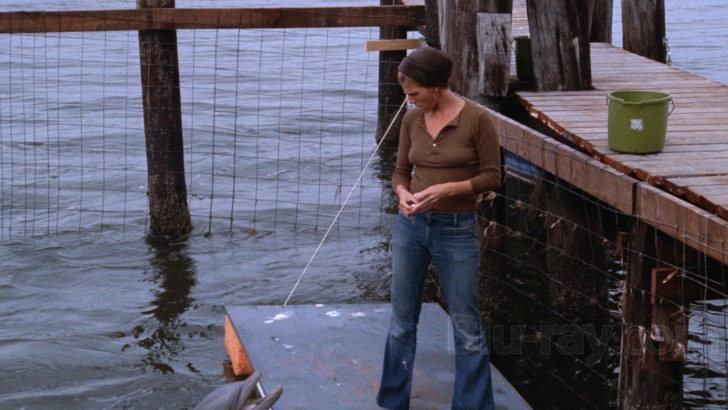
Obtaining Night Moves' audio was far less daunting than restoring its picture. The film's mono track has been taken from the original magnetic master, cleaned of any age-related deterioration and encoded in lossless DTS-HD MA 2.0. The dynamic range is surprisingly broad for a film from this era, and the mix effectively supports Night Moves' occasional action sequences, many of which are staged by Harry Moseby's stunt coordinator buddy, Joey (Edward Binns), and one of which happens for real and cannot be described without spoilers. The dialogue is clearly rendered, and environmental sound cues support each of the film's varied locales. The atmospheric score is by Michael Small, the composer of Klute and The Parallax View.
Night Moves Blu-ray Movie, Special Features and Extras 
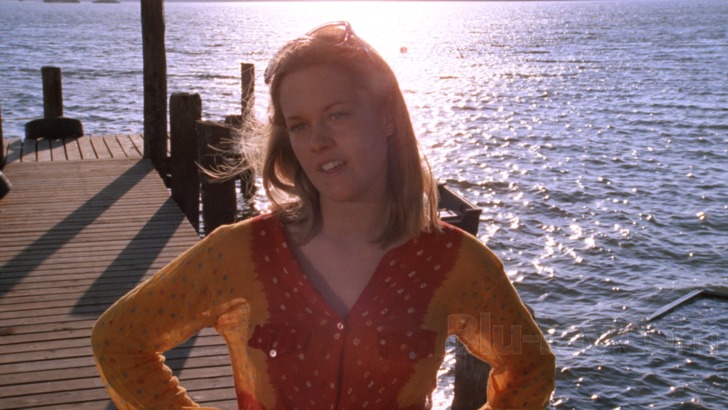
The extras have been ported over from Warner's 2005 DVD of Night Moves. The trailer has been
remastered in 1080p.
- Day of the Director (480i; 1.33:1; 8:35): This is a vintage EPK focusing on Arthur Penn at work.
- Trailer (1080p; 1.78:1; 2:21): "It's a game where every player is a pawn. Every move is a wrong one. And the winner loses everything."
Night Moves Blu-ray Movie, Overall Score and Recommendation 
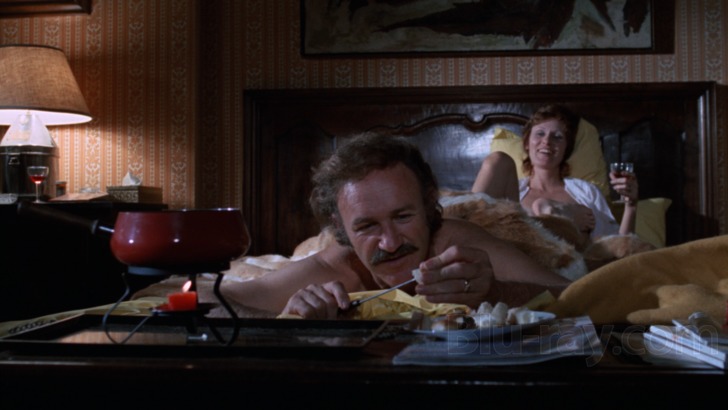
Gene Hackman's life-long friend Dustin Hoffman has repeatedly told the story of how Hackman
was thrown out of an acting class they shared, because the teacher claimed he wasn't doing any
acting. On the contrary, Hoffman insists, his buddy's acting was so natural and relaxed that no
one realized how thoroughly the actor had been replaced by his character. In Night Moves, Hackman effortlessly disappears into the role of
a man so discouraged and disenchanted that he just wants to be left alone, even by the wife he loves and is
losing. An unexpectedly challenging case rouses Harry Moseby from his sleepwalking torpor,
and against his better judgment Harry leaps into the fray without knowing what he's leaping
into—and he pays the price. WAC's Blu-ray of this still-underappreciated classic is exemplary
and highly recommended.
Similar titles
Similar titles you might also like

Kiss Me Deadly
1955

The Long Goodbye
4K Restoration
1973

Klute
1971

In the Heat of the Night 4K
1967

The Two Jakes 4K
1990

Under the Silver Lake
2018

Cutter's Way
Limited Edition to 3000
1981

The Black Dahlia
2006

Gone Baby Gone
2007

The Crimson Kimono
Limited Edition to 3000
1959

Twilight
1998

Gone Girl
2014

The Maltese Falcon 4K
1941

The Big Sleep
Warner Archive Collection
1946

Wild Horses
2015

Double Indemnity 4K
1944

The Killers
1946

Devil in a Blue Dress 4K
1995

The Big Heat 4K
1953

In the Electric Mist
2008
